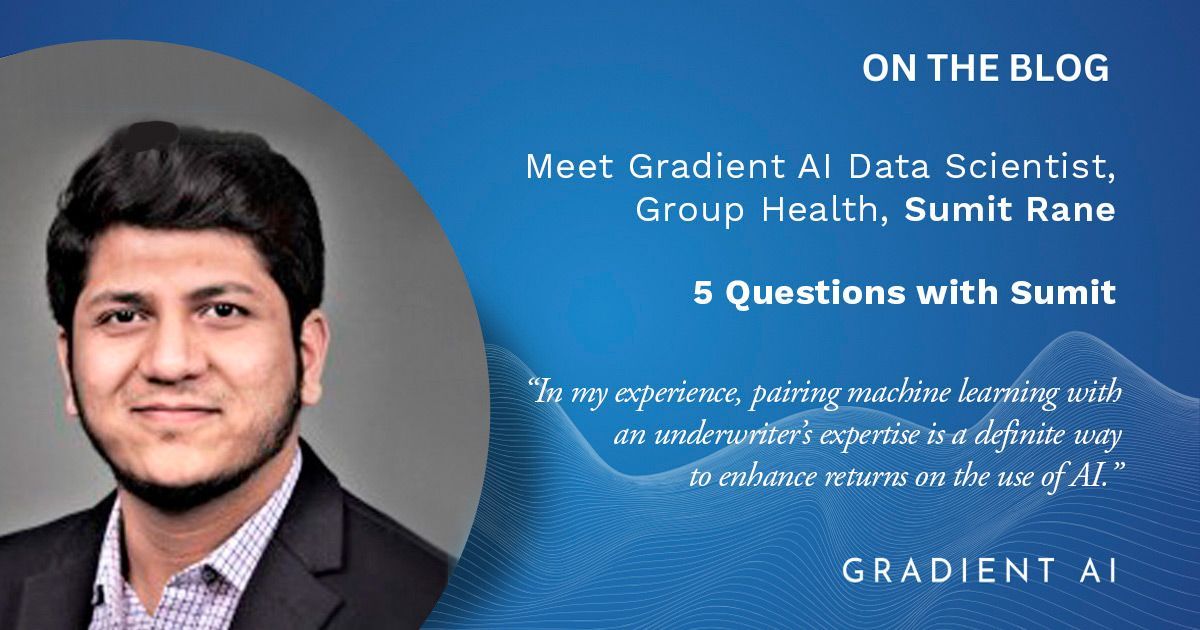5 Questions with Sumit Rane, Gradient AI Data Scientist, Group Health
Sumit Rane has been a Staff Data Scientist for Gradient AI’s SAIL™ Group Health underwriting solutions since 2021. He has leveraged his extensive experience and subject matter expertise in data science, machine learning (ML), and analytics to develop cutting-edge AI applications which solve unique problems in the healthcare insurance industry.
Sumit has a BS in Electrical Engineering from University of Pune, and a Master’s in Business Analytics (with a specialty in Statistics) from Drexel University, and recently completed a Leadership and Management Certificate from The Wharton School of Executive Education. He lives in Boston.
- What is the primary focus of your role as Staff Data Scientist?
My primary responsibility revolves around the development and maintenance of machine learning models tailored for our Group Health Underwriting solution, SAIL™. Additionally, my job involves actively exploring unique methodologies that not only help refine our models but also exhibit potential for broader application across other business lines at Gradient AI, thereby providing technical leadership and strategic guidance in our data science endeavors. - What advice would you give new customers considering optimizing the use of artificial intelligence in their underwriting processes?
Traditionally, most Group Health underwriters have used rule-based methods to evaluate risk, which seems intuitive for decision-making, but can often become unwieldy when there are complexities. These challenges can be overcome by harnessing the power of the AI and machine learning models that we are able to build today.
I think the insurance industry will likely never get to a state of zero uncertainty in the underwriting process, but machine learning can help us get a bit closer. In my experience, pairing ML with an underwriter’s expertise is a definite way to enhance returns on the use of AI.
Think of AI/ML solutions as a belaying system for rock climbers, where the underwriter is the person scaling the mountain, and the AI solution is the belayer holding the rope so that the rock climber can continue climbing while being safeguarded.
I would encourage our new customers to actively engage and establish a feedback loop with our client execs, where they continue to own the philosophy of risk selection, while our AI solutions help them refine the risk selection, increase their confidence in underwriting, and ultimately contribute to improving predictive capabilities. - What does a typical day at Gradient AI look like for you?
Given Gradient’s commitment to the ongoing enhancement of our Group Health underwriting solutions, engaging closely with my fellow Data Scientists, and fostering cross-collaboration with the Engineering and Product Teams on a daily basis is integral to my role.
Typically, the better part of my day encompasses technical tasks aimed at addressing intricate data science challenges; for example, defining problem statements, formalizing experiment design, generating hypotheses, extracting, and analyzing vast amounts of data, and going through rigorous iterative cycles of ML model experimentation to drive optimal performance.
I also dedicate time each day to strategic planning of deliverables, providing recommendations from an analytical perspective, and communicating technical decisions to stakeholders that ensure successful project completion. - What do you like most about your job at Gradient AI?
I highly value the supportive atmosphere at Gradient AI, which fosters a culture of idea-sharing. Moreover, I have consistently found fulfillment in working within small teams here which nurture collaboration and growth.
I also enjoy addressing the questions and challenges that we get from our Group Health customers concerning edge cases - and then providing them with a thorough analysis to explain the rationale behind our models’ predictions. At that time, I also try to identify discernible patterns within those investigations to facilitate necessary enhancements for future iterations of our model. - What do you like to do in your free time?
On weekdays, you'll catch me jamming out on my guitar or keyboard, trying to nail down some cover songs. I’m a lifelong student of music, so I continuously try to expand my repertoire. On weekends, I enjoy watching sports, going out, and doing outdoorsy stuff with my friends, or exploring the city. I also like to kick back and listen to podcasts about all sorts of things, like philosophy and cosmology.
- Bonus Question: What’s your favorite musical artist and/or favorite song?
I'm into a variety of music genres, so I've got quite a few favorites. But I'm a huge fan of the artist Steve Wilson and his song 'Arriving Somewhere' -- it's definitely up there on my list!
Thank you, Sumit! Be sure to check back on our blog as we ask 5 questions to different members of our talented staff across Gradient AI, to learn how they support the success of our clients.


